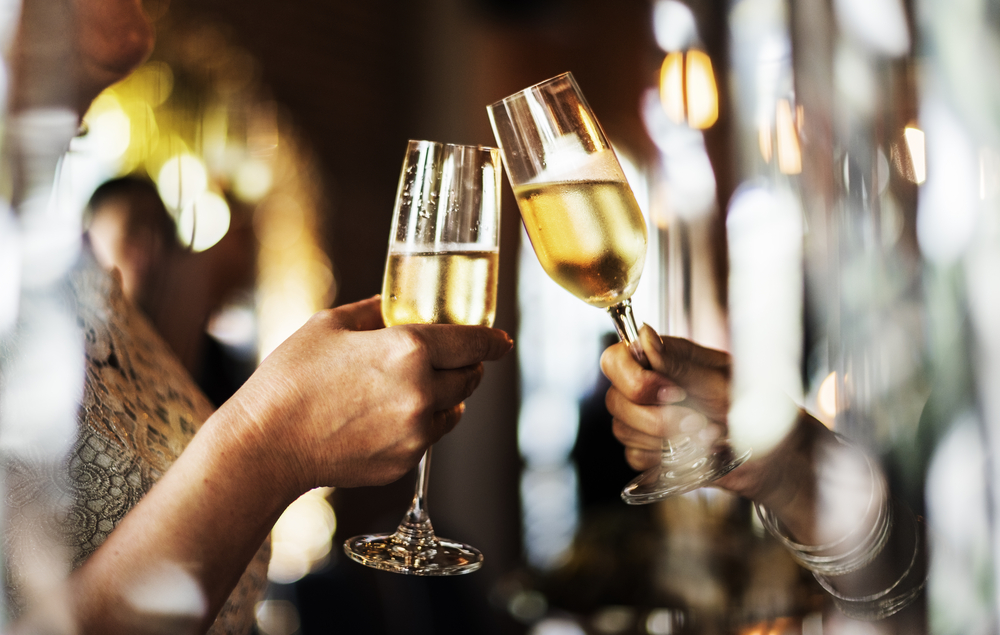I’ve been thinking of the origins of ‘Bless you’ recently. As we are facing a global pandemic, I was reminded about my time as a tour leader in Europe, and the story I used to tell our guests about where the phrase comes from. The phrase ‘God bless you’ is attributed to Pope Gregory the Great, who uttered it in the sixth century during a bubonic plague epidemic. Whenever someone sneezed, which was an obvious symptom of the plague, people would bless them in the hope that they remained in good health. The exchangeable German term ‘gesundheit’ literally means ‘health’. It is interesting that this term has endured all of this time, and is so very relevant for us all today.
The drinking party, in one form or another, has been around for thousands of years, and I wanted to explore the origins of how we use the occasion of getting together to drink bubbles, with toasting to the good health of our companions.
Historians guess that the toast most likely originated with the Greek libation, the custom of pouring out a portion of one’s drink in honour of the Gods. And yes, there were even gods of wine! The Greek God, Dionysus or Dionysos, known as Bacchus to the Romans, is the God of the vine, grape-harvest, wine-making, wine, fertility, ritual madness, religious ecstasy, and theatre.
From there, it was an easy step to offering a drink in honour of one’s companions.
Early medieval Anglo-Saxon feasts featured round-bottomed drinking glasses, designed to be emptied, since they could not be set down without spilling them. Guests drained their cups and then turned them upside-down on the table. This is most likely where the tradition of ‘bottoms up!’ comes from. Around the same time, the Saxon word ‘waes hael!’ (‘Good health!’), has been noted in history books.
The term ‘toast’ – as in drinking to someone’s health – comes from a literal piece of spiced or charred toast, which was dropped in a cup or bowl of wine, either as form of food or perhaps to make the wine taste better. Shakespeare mentions this in The Merry Wives of Windsor, in which Falstaff calls for a quart of spiced wine, then adds “Put a toast in it.” By the 18th century, the term ‘toast’ had been transferred from the floating bread, to the person honoured by the toast, and those who were very popular became known as the ‘toast of the town.’
It seems that the ‘bottoms up’ tradition of toasting was a common practice in many countries, but it was not one that everyone appreciated. The first temperance society, the Order of Temperance, established in Germany in 1517, was dedicated to abolishing toasts. Louis XIV banned toasting at his court, and in 1634, Massachusetts banned the ‘abominable’ custom of drinking to another’s health.
Eventually, in polite society, one no longer had to guzzle an entire wine glass for each proposed toast; a sip was considered plenty.
There are a few theories about the clinking of the glasses. One of these is to engage all the senses by adding the sound of clinking glassware. Some say it was to ward off evil spirits, while raising the glass may relate back to the raising of wine to the gods.
When I worked in Switzerland, we would take our guests for a fondue dinner and I would introduce the local custom of saying ‘cheers’ whilst looking your companions in the eye. If you did not make eye contact, you were considered untrustworthy. This custom is not unique to the Swiss, as there is also the tradition of drinking before or after battle and celebrating with friends and foes, and the need for eye contact to prove your trustworthiness.
In English we say ‘cheers!’, and often toast to people’s good health. The word ‘cheers’ comes from the Anglo-French of medieval times, ‘cheres’ meaning ‘face’, or the Old French ‘chiere’ for ‘expression’. It evolved to signify the mood shown on one’s face when happy. By the 1800s, saying ‘cheers’ came to represent gladness, or to show support or encouragement.
We shared information on our social media recently about how drinking champagne may help boost your immune system. In moderation of course, and not to be taken as medical advice!
So here’s cheers to your bubbly good health!
Here’s what they say to ‘toast’ to good health in other countries:
French – Santé (pronounced Son tay) or votre santé – good health or to your good health
Italian – Salute (prounounced Salut ay) – cheers, bless you, to good health
Spanish – Salud – (pronounced Salude) – cheers, bless you, to good health
German – Prost (from the latin prodesse – to be beneficial) or gesundheit – good health
Afrikaans – Gesondheid – good health
Scottish, Irish Gaelic – Sláinte (pronounced slawn-cha) – ‘to your health’ and is from the root ‘slán’ defined as ‘healthy’
Danish, Swedish and Norwegian – Skål – (pronounced Skoal) – ‘to your health’ or ‘bottoms up’
Finnish – Kippis – comes from an expression – to tilt glasses
Chinese – gānbēi! – literally means dry cup – ‘bottoms up’
How do you say cheers?

Natalie Pickett is the Founder of The Bubbles Review which is for people who like champagne and other bubbles, written by people who have a love of all things sparkling! At The Bubbles Review, we like to debunk some myths, make the art of drinking champagne accessible, explore bubbly regions and champagne bars, and provide events for you to join us and indulge.
Like to keep following us, get first look at events, receive bubbly information and be in our giveaway draws and have a chance to win a bubbly prize? You can join our list, it’s FREE to join here.
